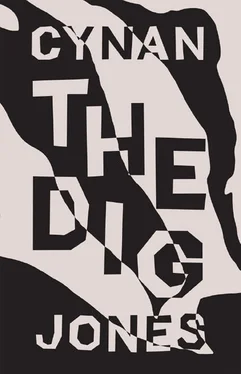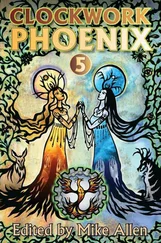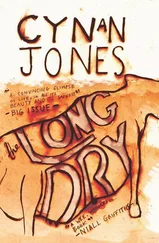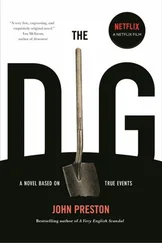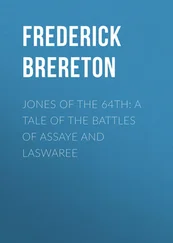He clicked on the kettle and wheeled the barrow out of the shed and took it to the heap and tipped on the rotting bedding. Around the field crows were turning over the dung and taking up the worms. They made a strange black contrast to the fresh white lambs. Even in their adjutant walking they contrasted.
He stood holding the barrow. The hedges were not yet beginning to green up. It was as if there was a holding back to them. The ewes cried ritually and the lambs bleated back and now and then came in from play and pushed roughly at their mothers, their tails frenzied as they drank, and here and there were lambs sleeping in their mothers’ lee, folded up and catlike.
He went back in and made up the mix and fed the orphans under the warm lamp, noticing freshly as he did every time the tight, carpety compactness of the lambs’ fleeces, the way in places the skin was loose with the potential for growth, the force with which they sucked and drank.
The ground of the stalls had dried a little and he filled the spray with water and hypochlorite and pumped it up to pressure and sprayed the floor and walls of the stall, the hypochlorite stinging his nose with the smell of swimming pools.
It was the swimming pool of junior school he always thought of, how they did not talk to each other back then even though at weekends they played together on one farm or the other, his farm or her grandparents’.
Then they went to different schools. Her to the Welsh school when they moved up, and he to the comprehensive in the other town. It was years before he saw her again. When he did he recognized her instantly. He knew then. They both knew.
He swilled his cup and swung the leftovers from his cup under the gate into the gathering puddles and the cloudy dregs steamed on the mud.
He reboiled the kettle and blew the inevitable flakes of hay from the cup and made a coffee and poured in sugar from the bag that was fawn-stained and lumpy. He shook in the milk mix, watched the powder fatten like wet flour and sink into the cup, leaving the coffee a strange vegetal color.
Presently it began to rain and within minutes he heard the rain butt outside trackle with the falling water. He could go in to the house now, but he did not want to.
Spits of rain came over the gate, making a damp crescent stain on the ground inside the entrance to the shed. She had wanted that fixed, he thought. She was right. The shed faced the weather that came in from the northwest and it would have made a difference to fashion up some baffle netting or something to block that wide draught, the rain petering in. He felt dismayed at all the things he hadn’t done, the things he had not fixed. He thought about whether he had wasted time and could have done these things but could not think of when he had wasted time; then he tried to think of everything he did that kept him so busy and there were very few big things he could find, just the everyday running of things. Somehow time had gone too fast. It just goes too fast, he said within himself.
He sat on the bales and let his eyes go round the shed. The sheep shifted into new comforts under the rain but there was nothing doing. The new lamb was drinking. He wondered what sort of a mother she would have made. They had talked about it, were ready for it. He pushed the thought away.
The cat scuttled in out of the weather and rubbed itself on the bales then went into the corner and settled itself and he felt a quiet transfer of love for the cat. His eyes filled with tears. He looked at the cat and held back the tears and felt himself smile desperately. Oh God, he said. You were so good. It was so good to have you.
The cat came up and sat with him, and for a while they sat like that, in the comfortable sound of the rain, and the closeness of the cat was almost too much.

The big man got the terriers in the van and seeing the brutalized chainsaw they were cooperative with each other and calmer, different from when they sensed they were working a badger, when they got individual and competitive.
When he got to the farm the farmer came out to meet him. He wore a stiff waxed jacket that looked new and unweathered. He had a seniority to him, a type of important mantle.
This was one of the bigger farms locally and had years ago been one of the manor farms that worked under the big house. You could tell the historical management of it by the wide fields and the way the big oaks were spread out in them.
It was misty here lower in the valley and the oaks looked veiled and there was a chattering of starlings on the wet ground. You could not see most of the birds. It was the sort of open drifting mist that played with the distance of things. You could hear the tractors working somewhere on the land.
There’s two spots, said the farmer. He was a magistrate and knew of the man from the hunts. His jaw was sagged from a cynical habit. It gave him the air of being above everything.
The big man nodded and got out the brutalized chainsaw and began to fill it with fuel. He was gruff and taciturn. He had added too much oil to the two-stroke so that the fuel would smoke.
The blade of the chainsaw had been taken off and he’d fixed a rubber pipe to the exhaust. It looked a strange, bastardized thing.
The magistrate farmer took the man over to the big modern barn. After the damp outside air there was a dustiness in the outbuilding.
The man brought the terriers down with him two to a lead and stationed them about the straw bales. Then he started the chainsaw there on the ground.
The noise filled out.
A little straw blew about the floor from the vent of the motor and the big man picked up the saw and revved it, crashing the noise in the barn. The mist had been deadening the noises so it was a very abrupt sound.
The dogs stood stock still, shaking a little with alertness, their eyes shifting minutely with little rapid surveillances.
He revved the saw again until it started to choke smoke through the thick rubber pipe. Then with a strange mobility he went round the stack and pumped in the smoke to the gaps and runs in the bales.
When the rats came out they came out with pace but the terriers ripped into them. The dogs were catlike in their speed. When they caught a rat they shook it like they were trying to break its back, which they were. They were yelping. Bites seemed to just drive them on.
The noise in the barn was terrible and solid. There was the clatter of the chainsaw and the metallic yelps of the dogs. That made a main terrible noise. It was a brief, flurried clatter of killing.
When they were done the men lined up the rats and counted them. The big man took the rats that were not quite dead, trod on their scaly tails and systematically smashed their heads with an electric fencing spike he’d picked up from the wall of the barn.
The farmer sickened a little at that brutalism. The dogs were whining and sniffed and their breathing came now in quick loud little pants. You could not smell the straw through the petrol smell and the choked-out smoke drifted about the barn like the mist outside.
There’s the log pile too, said the farmer. There was a strange hum in his ears after the noise in the barn. He had a disgust now for the big man but understood him as an instrument. He was surprised and impressed that the man could manage such a discipline in his dogs.
There’s something else too, said the magistrate farmer. His jaw sagged with the habit as he looked at the big man. The big man was experimentally putting weight down on a rat under his foot as if he was testing to burst it.
I can have a look, said the man.
Badgers, said the magistrate farmer.

Читать дальше
